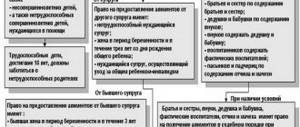Is it possible to transfer an apartment to pay alimony?
Legislatively, the possibility of transferring real estate to pay alimony is provided for in Art. 104 RF IC. But in practice, citizens who decide to draw up an alimony agreement often face refusals to notarize the transaction.
The fact is that alimony is cash in kind. The property presented to repay them cannot meet the child’s needs for food, tuition and other expenses. Consequently, the notary has grounds for refusing to certify the document.
By law, alimony can only be paid in three ways:
| As a share of earnings | In a fixed amount of money | Mixed |
| The amount of payments depends on the salary of the payer. For one minor 25% is transferred, for two – 33%, for three or more – 50% | Obligations are assigned when the payer does not have an official income level. The size depends on the cost of living in the region | It is allowed to assign mixed alimony when the payer receives confirmed earnings and additional income, if the recipient can prove them. The amount is influenced by the salary of the alimony obligee and the minimum for living in the region, as well as the financial situation of the parties |
Alimony in cash can satisfy the minor's needs for food and other needs, but through the transfer of property - not.
According to statistics, in 95% of cases, alimony payers are men. If they decide to transfer the property into the ownership of the child to terminate child support obligations, according to the law this will not be possible - the grounds are described in Art. 120 IC RF:
- the child's coming of age or emancipation;
- adoption of a minor;
- death of the payer or recipient.
Registration of real estate into the property of a child is not a basis for canceling obligations to pay alimony, and the mother can subsequently recover money through the court for the last 3 years.
If a man wants to give an apartment to his son or daughter, it is better to draw up a gift agreement with a notary. The alimony obligations will not stop.
Transferring real estate into ownership by re-registration of deed of gift documents and receiving a receipt increases risks. Even if the former spouses draw up an agreement indicating the cancellation of alimony obligations, the woman will subsequently be able to claim the money through the court. The man will be left homeless and will additionally have to pay monetary alimony ordered by the court.
Re-registration of living space is permitted in the following cases:
- Repayment of alimony debt. By court decision, bailiffs can seize property and sell it at auction. The proceeds go to pay off alimony debts, pay off enforcement fees and other government payments.
- When drawing up a child support agreement, which states that the payer will transfer funds and transfer the apartment into ownership of the child.
Important! Forcible seizure of living space by bailiffs is carried out subject to the amount of the debt and the penalty for the value of the property. For a debt of 200,000 rubles. the property will not be sold at auction.
Complete the survey and a lawyer will share a plan of action for alimony in your case for free.
You might find it useful:
Child support calculator
Penalty calculator
Samples of documents on alimony
Legal advice on alimony
Is it possible to give away an apartment as alimony?
The law does not provide for the possibility of replacing monthly payments with real estate directly. However, there is no ban on such actions.
In practice, the transfer of residential premises to offset the financial support of a minor is not uncommon. Parents often use this method.
Methods of transferring residential premises instead of cash:
- Notarial agreement. The document is drawn up in writing and certified by a notary. A prerequisite is the consent of the parties to the transaction. The father transfers ownership of the apartment to the child, and the mother accepts it on his behalf.
Important! Housing must be registered in the name of the minor.
If the child has reached 14 years of age, then he or she independently acts as a party to the agreement. The mother only agrees to the deal.
- Retention of property in enforcement proceedings. If funds are withheld forcibly (through bailiffs), then the payer is obliged to regularly pay the funds. Otherwise, debt is formed. If a large debt is formed, the bailiffs may seize the apartment belonging to the alimony holder. The main condition is that the amount of debt corresponds to the cost of living space. In addition, the housing should not be the payer’s only apartment.
The result of the arrest may be the sale of the apartment at auction or its transfer to the recipient.
Expert opinion
Stanislav Evseev
Lawyer. Experience 12 years. Specialization: civil, family, inheritance law.
The only option when transferring an apartment for financial support to a child is impossible is to recover the funds in court. The court cannot oblige the payer to transfer the apartment to a minor, even if he is the owner of 10 residential premises. Neither the magistrate nor the district court has this right.
Important! The mother will manage the apartment until the child reaches adulthood. She must be responsible for its safety and pay the bills.
What real estate can be transferred to pay alimony?
Some notaries still agree to certify alimony agreements, which indicate the repayment of alimony obligations by providing property. Here the payer can transfer the following property:
- purchased before marriage registration;
- share in housing purchased during marriage;
- received as a result of donation or inheritance.
Agreements drawn up on such terms are subject to challenge in court. According to the law, it is only possible to close the debt by re-registering the property in the name of the child.
The best option is to sell the home yourself and use the proceeds to pay off alimony obligations by concluding an appropriate agreement with the recipient.
Important! If the child support provider decides to transfer the property, it must be suitable for the child to live in. Transfer of sheds, garages and outbuildings is not permitted.
How to refuse child support?
How to draw up a settlement agreement on the payment of child support?
Share of the apartment towards alimony
In some cases, the family code allows the transfer of a share of ownership of real estate for alimony or part thereof. The child’s parents can resolve such issues peacefully by indicating all the details of their chosen solution in a voluntary written agreement on the transfer of housing for alimony.
Before concluding an agreement on transferring an apartment for alimony, you must independently assess the market value of the property. If parents cannot evaluate the apartment without causing disputes, then specialists in this field are involved in the matter. Upon completion of the assessment procedure, they will issue a conclusion on the cost of housing with justification for the identified amount, the details of which must be indicated in the text of the agreement. This document can be used in court.
The division of jointly acquired property is not equivalent to the procedure for transferring housing in exchange for child support. Since the allocation of apartment shares occurs between spouses, most often they receive 50% of the housing (Article 39 of the Family Code of the Russian Federation). As a result of the division of the apartment, ownership does not pass to the name of the child, especially since the division does not affect child support obligations.
Transfer of real estate by agreement
If the parties nevertheless decide to formalize the agreement and find a notary who promises to certify the transaction, they must act as follows:
- Independently calculate the amount of child support that must be paid until the child reaches adulthood.
- Determine the cost of housing. You can do this yourself. If there are disagreements, it is better to contact the appraisal office and get an official opinion.
- Draw up a draft agreement, indicating all the nuances.
- Visit a notary, pay the state fee and draw up a formal agreement using the content specified in the draft.
At the end, one agreement is handed over to the parties. The third copy remains with the notary for archival storage.
How to draw up an agreement?
There is no unified form of agreement on the payment of alimony and repayment of debt by providing real estate. When compiling, you must indicate the following information:
- Full name, registration addresses, passport details, dates of birth of the recipient and payer;
- what property is being transferred: house, apartment, etc.;
- technical data of the living space, location address;
- Full name, date of birth, series and number of the child’s birth certificate;
- a condition on the repayment of the alimony debt or on the transfer of housing into the possession of a minor to terminate the obligation to pay alimony;
- date of preparation and signature of the parties.
The agreement must contain the signature and seal of the notary.
Documentation
When visiting a notary you must provide:
- passports;
- marriage certificates;
- children's birth certificates;
- receipt of payment of state duty;
- technical documentation for real estate.
If a housing assessment was carried out, an expert opinion will be required.
Cost of notary services
The amount of the state duty is determined in accordance with Art. 333.19 of the Tax Code of the Russian Federation on property transactions and depends on the cost of housing:
| Up to 20,000 rub. | 4%, minimum 400 rub. |
| From 20,000 to 100,000 | 3% +800 rub. |
| From 100,000 to 200,000 | 2% + 3200 rub. |
| From 200,000 to 1,000,000 | 1% + 5200 rub. |
| From 1,000,000 | 0.5% + 13,200 rubles, maximum 60,000 rubles. |
The state duty is calculated as follows:
The cost of housing is 5,000,000 rubles, it is transferred into the ownership of the child. The parties have the right to independently determine who will pay the contribution - the recipient, the payer, or it will be divided in half.
5,000,000 x 0.5% = 25,000 rub.
25,000 + 13,200 = 38,200 rub. – total amount to be paid.
Are you tired of reading? We’ll tell you over the phone and answer your questions.
What kind of housing can be used for child support?
According to the rules of Russian civil legislation, the alienation of housing (sale, donation, transfer for use) is possible only if the alienating person is the owner of the housing.
This rule must also be followed in alimony legal relations. You can transfer an apartment into the ownership of a child if it belongs to the parent, for example...
- was purchased before marriage;
- was separated from the joint property of the spouses after divorce;
- was inherited;
- was privatized;
- was received as a gift.
Separately, it should be said about housing that was purchased with a mortgage. Although the owner of the mortgaged apartment is the borrower, the apartment is secured by a bank or credit institution, and therefore, with the permission of the bank or credit institution, it is impossible to sell, donate, or transfer the apartment into the ownership of another person. Removal of the collateral and disposal of the apartment is possible only after the mortgage loan has been repaid and interest has been paid.
Through the court
In court, the transfer of real estate into ownership is carried out only to pay off alimony debt. Housing is sold at auction after the claimant contacts the bailiffs with a corresponding application.
It will not be possible to cancel alimony obligations for the future through the court by transferring property - this way only money is recovered.
The woman with whom the child remains has several options to receive property:
- Divide the property. The plaintiff is paid compensation equal to his share in the housing. Subsequently, you can collect alimony.
- Draw up an alimony agreement.
Possible options
To terminate alimony obligations if alimony is not collected in court, a woman may simply not apply to the court, having drawn up an agreement with her ex-spouse.
If the funds have already been collected in court, it will not be possible to refuse them - this will violate the interests of the minor. Termination of obligations will occur only upon the occurrence of any of the grounds specified in Art. 120 IC RF.
Cancellation of obligations under the agreement is carried out upon the expiration of its validity period or upon the occurrence of the grounds provided for by it (clause 1 of Article 120 of the RF IC). However, the latter does not mean that the property can be transferred - the likelihood of consent to have the transaction certified by a notary is close to a minimum.
Arbitrage practice
Cases from judicial practice indicate that women can indeed agree to formalize an agreement and provide property to a child, and then collect alimony through the court. Judges usually take their side, since the transfer of real estate does not relieve alimony obligations.
The situation is different with the provision of housing to pay off an already accumulated debt: its size is already known at the time of registration of the transaction, and the cost of the apartment is determined by appraisers, and if the recipient agrees, the conclusion of an agreement is allowed.
Purpose of additional payments
The transferred property does not guarantee relief from alimony obligations. If over time the ex-spouse’s earnings increase and the woman assumes that possible payments exceed the cost of housing, she has the right to collect additional payments, justifying this as a violation of the interests of the child.
To recover additional funds in court, it is necessary to justify the needs of the minor by providing receipts for food and receipts for payment of tuition, additional sections, etc.
It is also possible to recover alimony in full through the court. If an agreement was previously drawn up, it is first disputed, and then funds are collected.
Frequently asked questions
Is it possible to leave a receipt for payment of alimony by providing an apartment?
The receipt has no legal significance and is easily disputed in court. It is better to conclude an agreement with a notary, but it does not cancel alimony obligations if the property is provided as alimony.
Who becomes the owner of the transferred property?
According to the law, alimony is paid to provide for the needs of the child, but is received by the mother, who is the legal representative. However, the property must be registered in the name of a minor, since it is transferred in his interests. If this is not done, the ex-wife may subsequently refuse to re-register documents for the child.
How to transfer an apartment to pay alimony?
We have already mentioned above that the transfer of an apartment for alimony payments can occur in two ways:
- voluntarily - by written agreement between the parents;
- forcibly (during enforcement proceedings) - due to non-payment of alimony and the formation of debt.
Below we will consider in detail the first order, as it is more popular among parents. As for the second order, it does not always depend on the will of the parents and is within the competence of bailiffs conducting enforcement proceedings, and is used quite rarely.
Procedure
All issues related to the transfer of an apartment (or its share) into the ownership of a child instead of subsequent alimony payments are resolved by the parents independently and voluntarily.
The procedure will be as follows:
- Calculate what payments a child is entitled to before reaching adulthood. It is advisable to make the calculation in writing;
- Estimate the cost of the apartment (or share). It is advisable to order an expert assessment of the market value of the apartment (share) at the time of conclusion of the contract. If a dispute arises subsequently, this document will serve as evidence in court;
- Make sure that the child’s rights are not violated due to the difference in the cost of the apartment and the amount of child support payments due to the child until adulthood. Agree on ways to eliminate the difference;
- Agree on the procedure for transferring the apartment and other significant provisions of the contract (for example, on the timing of transferring the apartment for the child’s use, on the payment of additional funds for the child’s needs);
- Prepare documents (passports, child’s birth certificate, title and registration documents for the apartment, an assessment of the market value of the apartment, certificates of place of residence of parents and children);
- Prepare and certify in a notary's office an agreement on the fulfillment of child support obligations by providing the child with real estate ;
- Prepare and notarize (share) donation agreement
- Register ownership of the apartment (share) in the child’s name and obtain a certificate of ownership.
Expert opinion
Semyon Frolov
Lawyer. 7 years of experience. Specialization: family, inheritance, housing law.
In addition to the listed actions, some parents also draw up a receipt stating that after transferring the child’s ownership of the apartment, claims for alimony will not be made or fulfilled. However, such a receipt has no legal force, since it violates the rights of the child.
Unfortunately, the risk remains that even after signing all the documents and transferring/receiving the apartment, an unscrupulous parent will want to obtain monetary payments through the courts (and receive them). Read more about this below.
Procedure
The procedure for preparing and signing an agreement in the presence of a lawyer is standard, and is no different from the procedure for signing a parental agreement on the payment of alimony.
It is only important that the agreement contains all the conditions essential for the parents and corresponds to their plans, wishes, capabilities and agreements. Then subsequently there will be no disputes regarding its interpretation and implementation. It is equally important that the agreement does not violate the legal rights of the child and parents, as a result of which it can be challenged and declared invalid.
Therefore, the closest attention should be paid to the preparation of a legally competent and complete agreement. It is advisable that the agreement be prepared by the parents not on their own, but with the help of a lawyer who will study all the legal aspects and take into account all the circumstances.
The agreement is drawn up and signed in three copies: one remains for storage in the notary’s office, the remaining two are issued to the parties.
will be required for the procedure :
- Passports of the parties (parents);
- Child's birth certificate (or passport);
- Title documents (confirming ownership) for the apartment;
- Appraisal documents for the apartment;
- Certificates of place of residence of parents and child.
Both parents must be present in person during the signing and notarization of the agreement. If the child in whose favor the parents are entering into an agreement is already 14 years old, he must also be present.
Sample agreement on the transfer of an apartment for alimony
The agreement is drawn up in writing and is subject to mandatory notarization (in accordance with Article 100 of the RF IC).
An agreement on the transfer of an apartment for child support payments should contain approximately the following information:
- Place of signing the agreement (city, country);
- Date of;
- Document title: Agreement on the transfer of property for alimony payments;
- Details of the parties (full name, date of birth, residential and registration address, passport details);
- Details of the child in whose favor the agreement is concluded (full name, date of birth, residential address);
- Information about the intention of the parties to fulfill their alimony obligations to the child by transferring the apartment into his ownership;
- Information about the apartment that is transferred to the child’s ownership (address, living space, number of rooms, etc.);
- Information on the relationship between the cost of the apartment (with reference to the appraisal report) and the amount of alimony payments due to the child until adulthood. A method for eliminating the difference between these amounts if it arises not in favor of the child;
- The procedure and deadline for fulfilling the agreement (for example, the deadline for drawing up a gift agreement between a parent and a child, the term and procedure for providing an apartment for the child’s use);
- The procedure and period for registering ownership of an apartment in the Unified State Register;
- Additional rights and obligations of the parties;
- Duration of the agreement;
- The procedure for making changes to the agreement;
- Responsibility of the parties for failure to fulfill the agreement;
- Signatures of the parties.
If you find it difficult to independently prepare a competent and safe (from the point of view of your rights and the rights of the child) agreement, consult with our lawyer.
Expenses
The transfer of an apartment to a child is carried out through the execution of a parental agreement (and sometimes a gift agreement), as well as subsequent registration of ownership of the apartment with state registration authorities. Therefore, expenses are inevitable.
Main expenses:
- Legal consultation;
- Payment for the services of an apartment appraiser (assessing the market value of an apartment can cost from 1,000 to 5,000 rubles);
- Payment for notarial actions (for certification of a parental agreement you will have to pay about 500 rubles, as for a transaction that is not subject to assessment, for certification of a gift agreement - 0.3% of the cost of the apartment, but not less than 200 rubles);
- State duty (you will have to pay about 2,000 rubles to register ownership of an apartment);
- Additional costs (copying, transportation, postage).







